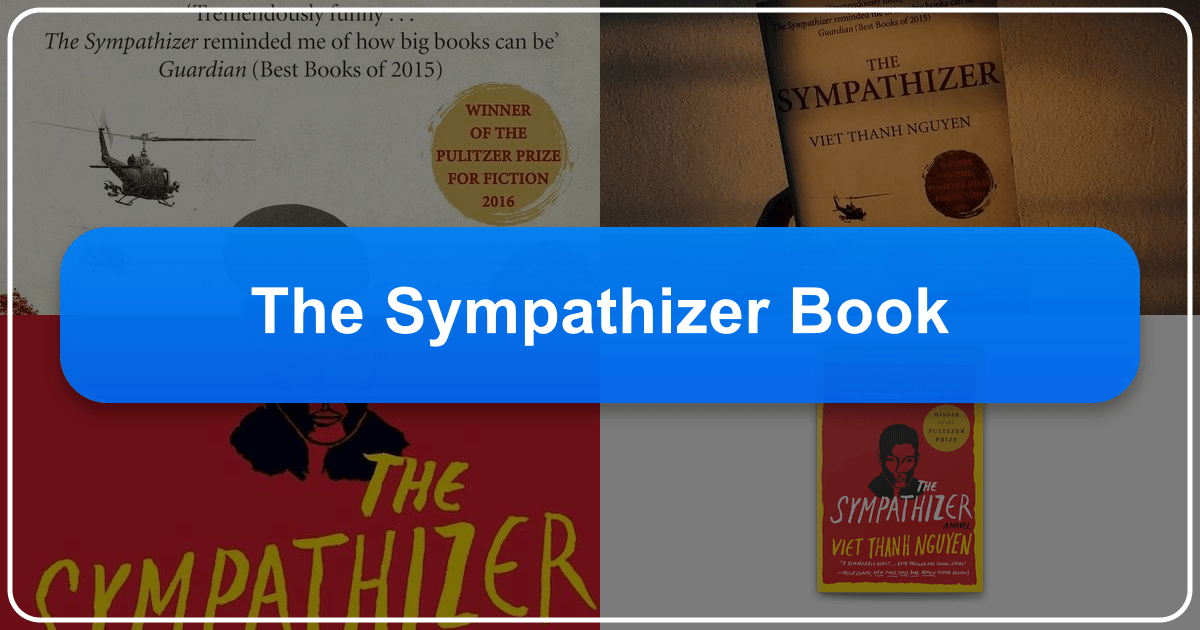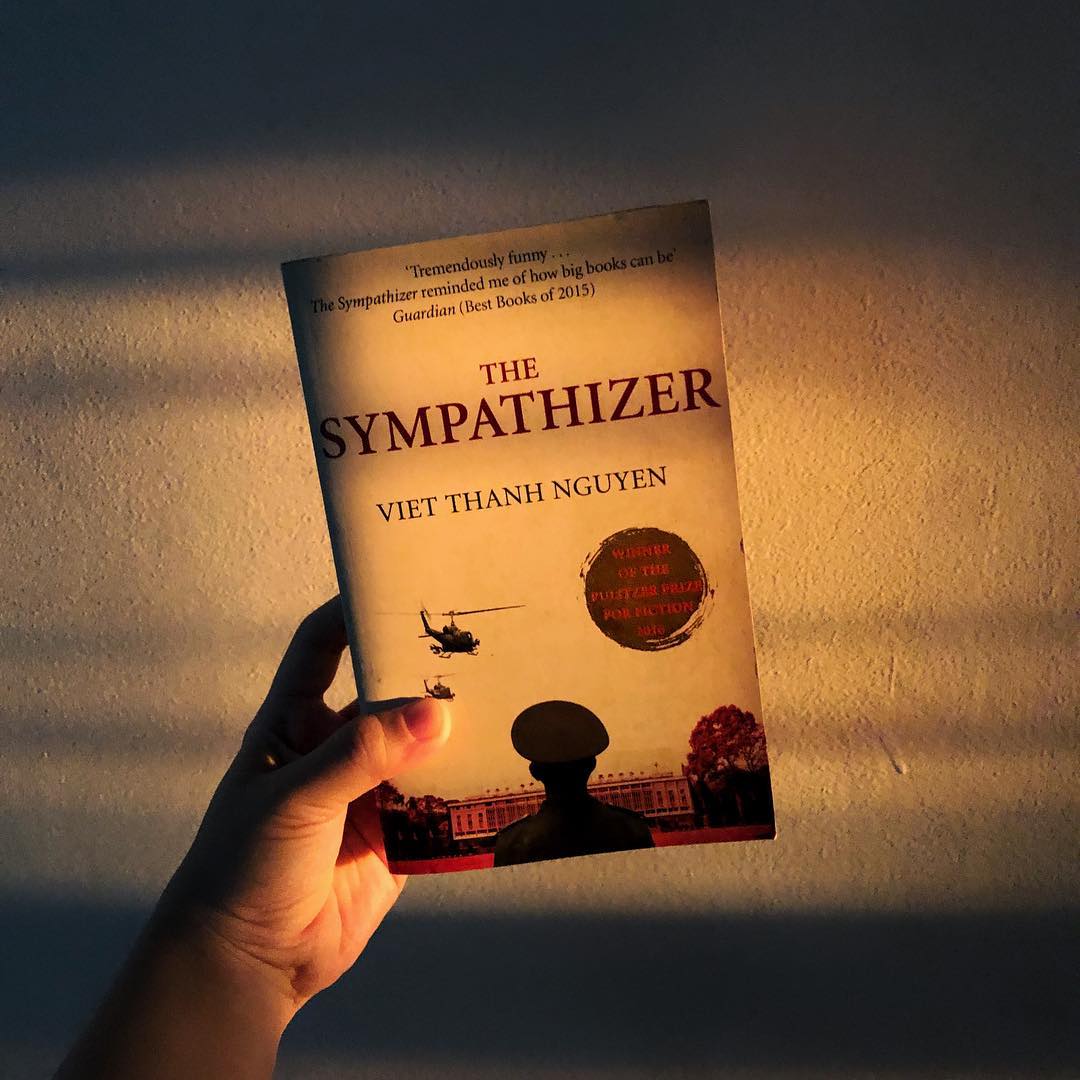*The Sympathizer* Book: A Comprehensive Exploration

Viet Thanh Nguyen’s The Sympathizer, a Pulitzer Prize-winning novel, transcends the typical war narrative, offering a profound and multifaceted exploration of identity, loyalty, and the enduring consequences of conflict. This analysis delves into the novel’s themes, literary merit, and lasting cultural impact, using the framework of key aspects related to books, authors, reading, libraries, and cultural influence.
I. The Sympathizer as a Work of Literature
A. Genre and Classification: The Sympathizer defies easy categorization. While fundamentally a novel, it seamlessly blends genres. It is a gripping espionage thriller, keeping the reader on the edge of their seat with its twists and turns of a double agent’s life. Simultaneously, it functions as a deeply insightful historical novel, meticulously portraying the political and social climate of Vietnam during and after the war. The novel’s sharp wit and darkly comedic elements also place it within the realm of satirical fiction, offering a critical lens through which to examine the absurdities of war and power dynamics. Its exploration of complex moral ambiguities challenges conventional notions of heroism and villainy, setting it apart from simpler good versus evil narratives.

B. Plot Summary and Narrative Structure: The novel’s narrative unfolds from the perspective of an unnamed, half-French, half-Vietnamese Captain serving as a double agent for the Viet Cong within the South Vietnamese army. The story moves between the chaos of the Fall of Saigon, the Captain’s escape to the United States, and his experiences as a refugee in Los Angeles. Throughout, the Captain’s inner turmoil is vividly portrayed; he is torn between his loyalty to his communist superiors and his complex feelings for the country and people he has betrayed. The novel’s non-linear structure, employing flashbacks and shifting perspectives, mirrors the fragmented nature of memory and the disorienting effects of war. The use of epistolary elements, such as letters and reports to the Captain’s superiors, further enhances the novel’s intricate and suspenseful plot.

C. Literary Style and Techniques: Nguyen’s writing style is as remarkable as the novel’s plot. His prose is simultaneously sophisticated and accessible, blending elegant language with a raw, emotionally resonant portrayal of the Captain’s experiences. The author masterfully utilizes irony, satire, and dark humor to expose the hypocrisy and brutality of war and the complexities of human nature. The shifting narrative perspective adds another layer to the novel’s depth, allowing the reader to engage with the complexities of the Captain’s character and to understand the perspectives of both sides of the conflict. The use of language itself becomes a significant element, reflecting the Captain’s fractured identity and the cultural clashes inherent in the narrative.

II. Viet Thanh Nguyen: Authorial Background and Influences
A. Author Biography and Personal Experiences: Viet Thanh Nguyen’s personal experience as a Vietnamese refugee who immigrated to the United States profoundly shapes The Sympathizer. His insights into the lives of Vietnamese refugees in America, the complexities of navigating a new culture, and the lingering effects of war and displacement are woven into the novel’s fabric. The author’s scholarly work in postcolonial studies and critical theory further enhances his critical analysis of historical events and their implications.
B. Writing Style and Inspirations: Nguyen’s literary style draws upon both Western and Eastern literary traditions. His work reflects the influence of classic Western novelists such as Graham Greene and Joseph Conrad, known for their exploration of espionage, moral ambiguity, and political intrigue. However, he integrates this with a distinctly Vietnamese perspective, giving voice to a marginalized experience rarely explored in mainstream literature. The narrative techniques employed, such as the unreliable narrator and non-linear storytelling, contribute to the novel’s postmodern feel, drawing on the works of authors like Vladimir Nabokov and Ralph Ellison.
C. Themes and Motivations: Nguyen’s primary goal in writing The Sympathizer was to provide a counter-narrative to the dominant Western accounts of the Vietnam War, offering a Vietnamese perspective often overlooked or misrepresented. The novel grapples with themes of identity – both national and personal – the complexities of loyalty and betrayal, the devastating consequences of war, and the challenges faced by refugees and immigrants in adapting to new environments. He masterfully weaves these themes together, prompting critical reflection on the lasting effects of conflict and the human cost of political ideologies.
III. Reading and Engaging with The Sympathizer
A. Educational Value: The Sympathizer is a powerful teaching tool for understanding the Vietnam War and its ramifications. It challenges readers to move beyond simplified narratives of good and evil, prompting a more nuanced and critical understanding of the conflict. The novel also provides insights into the refugee experience and the difficulties of navigating cultural assimilation. The use of literary techniques and the complex characters provide fertile ground for literary analysis.
B. Life Lessons and Themes: The novel’s exploration of moral ambiguity, the complexities of identity, and the enduring impact of trauma offer rich opportunities for self-reflection. The protagonist’s internal conflicts force readers to consider the gray areas of loyalty, betrayal, and patriotism. His experiences as a double agent and a refugee highlight the human resilience to adapt and navigate through adverse situations. These resonate far beyond the specific historical context of the war.
C. Reading Habits and Discussion: Given the novel’s complexity and multifaceted nature, it benefits from active reading and thoughtful reflection. The novel’s ironic tone and the unreliable narrator require a careful reading to decipher the truth. Engaging in discussions and sharing interpretations with others can enrich one’s understanding of the novel and its deeper implications. Book clubs and online forums devoted to The Sympathizer offer ample opportunities for this kind of interaction.
IV. The Sympathizer’s Presence in Libraries and Archives
A. Public and Digital Libraries: The Sympathizer is widely available in most public and university libraries, both in print and digital formats. Its presence reflects the novel’s critical and popular acclaim, cementing its place as significant literature. The accessibility through digital libraries further expands its reach to a global readership.
B. Special Collections and Archives: While not likely to be a focus of rare book collections at this time, The Sympathizer will inevitably become a significant text in literary archives, particularly those relating to Vietnamese-American literature, the Vietnam War, and contemporary fiction. Its place in future collections is secured by its award-winning status and critical evaluation.
C. Preservation and Access: The accessibility of The Sympathizer through various library formats is important for its preservation and long-term availability for future generations. Digital formats allow for easier access and wider dissemination, though preserving the original print versions is equally essential for maintaining the integrity of the literary work. The ongoing inclusion of The Sympathizer in library systems serves as an integral part of preserving its legacy.
V. Cultural Impact and Legacy of The Sympathizer
A. Literary Influence: The Sympathizer has undeniably influenced contemporary literature by showcasing the potential of blending genres to create a more complex and nuanced narrative. Its success has paved the way for more diverse voices and perspectives in the literary world, especially in relation to war narratives and the refugee experience. It has prompted critical reflection on the limitations of conventional storytelling and the need for more inclusive narratives.
B. Adaptations and Interpretations: The adaptation of The Sympathizer into an HBO series starring Robert Downey Jr. further amplified its cultural reach, making its themes and characters accessible to a broader audience. This adaptation, with its visual interpretation and broader storyline, brings different elements of the novel to the forefront.
C. Awards and Recognition: The Pulitzer Prize, along with numerous other awards, solidified The Sympathizer’s status as a significant literary achievement. These awards underscore the novel’s impact on readers and critics alike. The recognition it received validates the importance of exploring marginalized perspectives within mainstream literature and encourages similar explorations.
D. Communities and Discussion: The novel has sparked vigorous discussions and communities both in academic settings and among general readers. Online forums, book clubs, and scholarly articles all contribute to the ongoing critical engagement with The Sympathizer, ensuring its continued relevance and impact. The passionate discussions it has engendered reflect its capacity to elicit diverse perspectives and complex emotions. This continuing dialogue further solidifies its position within contemporary cultural discourse.
In conclusion, Viet Thanh Nguyen’s The Sympathizer remains a powerful and influential work of literature. Its blend of genres, sophisticated prose, and exploration of complex themes has resonated deeply with readers and critics worldwide, establishing its place as a significant contribution to contemporary fiction and a lasting testament to the power of storytelling. Its ongoing impact on literature, film, and cultural dialogue is a reflection of its unique and compelling narrative.